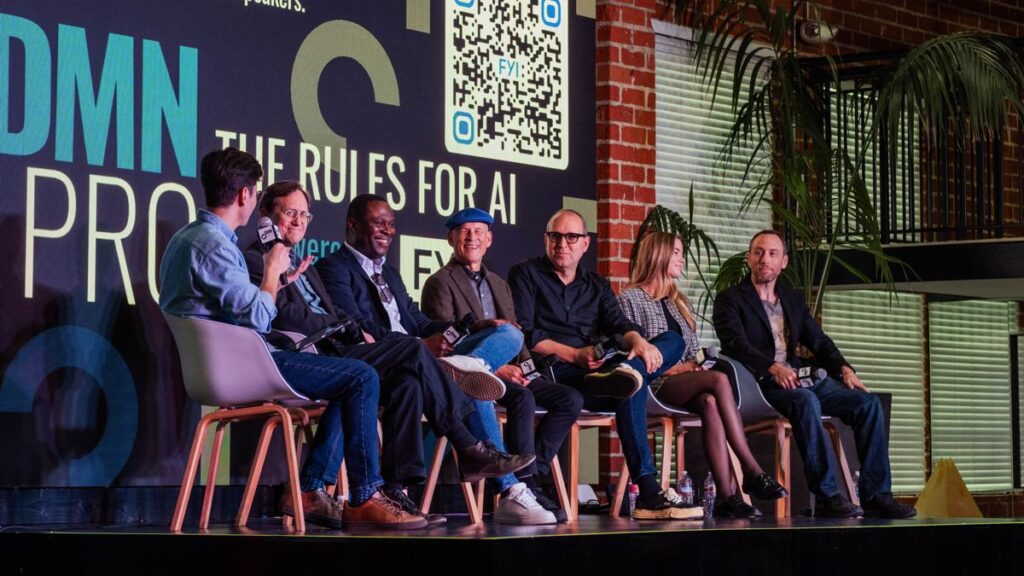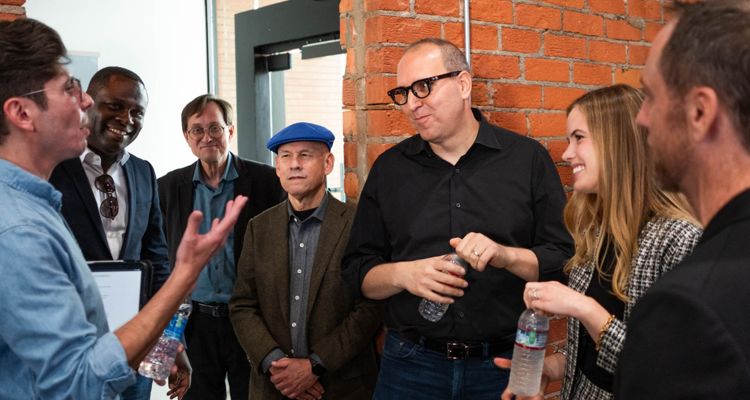AI Is Officially the Music Industry’s 800 lb. Gorilla — We Asked Top Executives What’s Likely to Happen Next


Photo Credit: Evatt Carrodus
The exponential growth of artificial intelligence over the last year is a metaphorical genie that’s out of the bottle, the toothpaste out of the tube. But the music industry has a long and storied history of fighting back during technological upheaval — and oftentimes benefitting from the disruption. In that light, Digital Music News spoke with top music industry experts during our ‘Rules for AI’ mini-conference in Los Angeles to hear the challenges they believe the industry will need to surmount.
For those who missed our ‘Rules for AI’ mini-conference, it was an event loaded with AI insights and ideas, including serious discussions related to the regulatory, legal, and legislative frameworks being created. On those fronts, industry executives and legal experts isolated problem areas the industry will face going forward, discussing licensing frameworks and the potential net-positive impact AI can have for the industry with proper guardrails in place.
DMN Chief Revenue Officer Noah Itman moderated the expert panel, which featured Mark Meikle (Cofounder & CEO Easy Song), Shannon Sorensen (SVP, Business Legal Affairs, NMPA), Michael Simon (President, Rumblefish), Mark Sazer (American Federation of Musicians Local 47), Sherlo Esajas (Manager Public Affairs, BUMA), and Bob Clarida (IP Lawyer, Reitler, Kailas & Rosenblatt).
Each of these panelists shared their expertise on copyright law, EU regulations, the deeper AI tech, and what collective bargaining can do for artists. It was a look not only at how to keep Big Tech on the ethical path, but also how the technology could be used to grow the revenue pie in the future. And despite endless tales of dystopian woe, most execs were upbeat on AI’s potential.
“AI is a net positive for the music industry and artists. We want musicians to be able to use a new technology like artificial intelligence,” shared Shannon Sorensen, SVP Business & Legal Affairs at the National Music Publishers’ Association (NMPA). “This is an advantage for creators. However, we also need to make sure that human artists are not being exploited in the development or deployment of those systems.”
“For example, you have the deep fakes issue. That’s one way of exploiting a human—to steal their voice to train an AI. Another way exploitation might manifest is by training generative AI on human creative works to output something that competes with them in a marketplace,” Sorensen continued.
Sorenson also highlighted how background music creators could be replaced on film and TV productions after AI has been trained on hundreds of hours of background music. That is, for now.
“That’s currently where AI is for music right now—in the production space—it’s not quite there to mimic pop music,” Sorensen continued. “So that’s what we’re fighting against — companies who train hundreds of hours of this music, writing an AI that can replicate background music that removes the human element.”
Shifting to the working musician front, the discssion turned to Marc Sazer, President of the American Federation of Musicians Local 47, a labor union serving to promote and protect the concerns of professional musicians in the music industry.
Marc Sazer says his union is looking at ways to ensure AI is trained in an ethical way that compensates musicians fairly. “We’ve gotten through lots of very tough moments with technology throughout the history of the music industry,” Sazer shared. “All the way back from wax cylinders to now Spotify and Apple music.”
“But this is something quite different,” Sazer continued, referring to the ways in which artificial intelligence has been deployed so far within the industry. “This is something that could actually remove human beings from the creative process. That participation is what allows us to be a part of this culture that is ours collectively. I think it’s fair to say that musicians that are part of our union are pretty scared. The prospect of our cultural legacy being replaced by generative AI is something I really appreciate an ongoing discussion about.”
But as we well know, AI and deep fakes pose risks that go beyond the music industr. In the United States, the rights to publicity may provide an avenue of protection for musicians against AI exploitation, as clarified by Bob Clarida, an intellectual property expert and partner at Reitler, Kailas, & Rosenblatt.
“The precedent was set long before AI when Bette Midler sued Ford Motors over the use of a voice-over purposefully designed to sound exactly like Midler. The tort that was established in that case is that the court recognized that mimicking a voice is taking something valuable from Bette Midler,” Clarida explained. “People thought Bette Midler had something to do with that commercial when she did not.”
“If people are deceived into believing an artist had a hand in a work that they did not, that might be actionable in a legal sense. If anything purports to be something that it is not—well there are existing laws in place designed to deal with those situations.”
“However, there is an exploration around a federally established right of publicity, but for now, it’s every state for themselves. Every state is a little different in that regard, with some of them really flying by the seat of their pants. But I think the deep fakes issue might be the impetus we see that pushes efforts for a federally recognized right of publicity, pushing that effort over the line.”
In discussions around the U.S. Copyright Office ruling that an AI-generated work cannot be copyrighted, our panel of experts brought up some interesting points. Noah asked our panelists what percentage of human influence they believed a work would need in order to be copyrightable.

Photo Credit: Evatt Carrodus
“I don’t think that the 50% metric is usable in this regard,” Shannon Sorensen answered. “I think that standards that currently exist are going to be applied—which is you have to have a human author. Selfie by a monkey? No copyright. The Copyright Office has drawn that pretty stark line at needing the human element and generative AI alone—the work is not copyrightable. But afterwards, with human editing?”
“I think that line is a little bit arbitrary. A court will look at it and ask, ‘does this work embody a human’s creative artistic expression? That’s been the standard applied in the past by the court, and the court will return to those standards.”
“We’ve been talking a lot about the fake Drake song, all of the creative decisions that were made in that were an added human element,” chimed in Bob Clarida. “It would be copyrightable in its entirety based on those standards, so it doesn’t seem like you need a large quantum of human authorship, simply based on those standards.”
Is the concern about how AI is being used unjustifiable? Is the industry putting too much energy into worrying about what could happen? No, but that doesn’t mean the advent of AI in music won’t be a wave that needs to be crested yet again.
Michael Simon shared his opinion saying, “Maybe I’m a little more concerned now than I was this morning. But the history of our business, and you can go back to the beginning. We’ve gone through several permutations of the industry, with several technical introductions. Each one of them we’ve gone into that turning which was said to destroy us into a key revenue source. We’ve seen that time and time again.”
“Piano rolls were a threat to music because pianos could play themselves. Recorded media, whether cylinder or flat disc, direct to consumer—who would listen to live orchestras anymore? There are hundreds of examples in the music industry of how we have adapted to change. We have figured out what the rights are, we’ve created a commercial market around those rights, and we’ve flourished.”
The role AI plays in the music industry is not going to be diminished; it is only going to get bigger. As Shannon mentioned, it is currently impacting the production space now—but within a few years it could very well be the face of pop music. So what does that mean for us as artists and creatives?
It means we must value and choose humanity. Marc Sazer summarized it best at the close of this panel saying, “If you value music, you have to value musicians.”
Link to the source article – https://www.digitalmusicnews.com/2023/11/01/rules-for-ai-music-industry-800-lb-gorilla/
Recommended for you
-
Boss FS-5U Non-Latching Footswitch
$44,99 Buy From Amazon -
Middle Eastern Tonbak GURU – Large original Essential 24bit WAVE Samples/Loop/Grooves Studio Library
$12,99 Buy From Amazon -
Fender Squier Affinity Precision Bass PJ – Surf Green Bundle with Rumble 15 Amplifier, Instrument Cable, Gig Bag, Tuner, Strap, and Austin Bazaar Instructional DVD
$429,99 Buy From Amazon -
Yamaha Standard Bb Cornet YCR2310II
$299,00 Buy From Amazon -
Odyssey DJBOOTHM65 Media DJ Booth with 65-Inch Flat Screen Monitor Mount
$579,95 Buy From Amazon -
QuadCast Boom Arm, Mic Arm Microphone Arm for HyperX QuadCast SoloCast Blue Yeti Fifine AM8 and Most Mic, Mic Stand Desk with 3/8″ to 5/8″ Adapter by SUNMON
$26,99 Buy From Amazon -
PHILIPS Over Ear Open Back Stereo Headphones Wired with Detachable Audio Jack, Studio Monitor Headphones for Recording Podcast DJ Music Piano Guitar (SHP9600)
$129,99 Buy From Amazon -
PreSonus AudioBox 96 25th Anniversary Studio Recording Bundle with Studio One Artist DAW Music Production Software
$0,00 Buy From Amazon













Responses